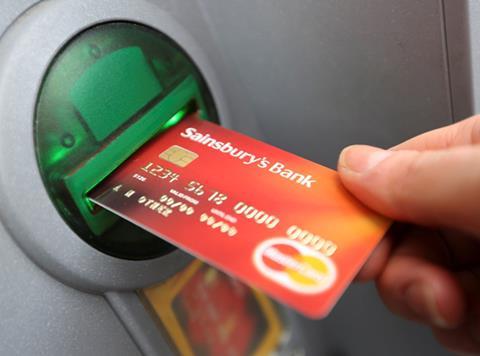
Top story
Sainsbury’s has announced it will wind down its core banking operations and instead offer financial services via third-party financial groups.
The supermarket today updated the market on a strategic review of its financial services division ahead of a 7 February strategy update.
It said financial services products it offers in the future will be provided by dedicated financial services providers through a distributed model, as the group already does with its insurance products.
This means that over time it will result in a phased withdrawal from its core banking business.
Meanwhile, Jim Brown will retire from his role as CEO of Sainsbury’s Bank. Robert Mulhall has been appointed as his successor.
Mulhall is an “experienced retail banking leader with a strong track record of delivering successful transformation”.
Until 2022 he was the CEO of Allied Irish Bank’s UK division, having previously led AIB’s Irish retail banking division.
Since 2022, Robert has led the global financial services consulting business of Vision Consulting, focused on business transformation.
Mulhall will take up the role as CEO of Sainsbury’s Bank at the end of March after a period of handover, subject to regulatory approval.
Sainsbury’s CEO Simon Roberts said: “We have been clear since we launched our Food First strategy in 2020 that we would concentrate our efforts on our core retail businesses and today’s announcement reflects that strategic focus.
“It’s business as usual for now at Sainsbury’s Bank and there will be no immediate changes to products and services as a result of today’s announcement. We will of course communicate directly to customers well in advance of any changes to their products and services.”
Morning update
Bakkavor has said its 2023 profits, net debt and leverage are all expected to be ahead of market expectations in a full-year trading update.
The own label group’s like-for-like revenue grew by 5.3% in the full 2023 year to £2.21bn, supported by price growth in the UK and volume recovery in China.
In the UK, sales were up 5.3% on a like-for-like basis as it continued to win market share, driven by strong service, targeted innovation and net business gains.
US revenues were down 8.4% on a comparative basis as focus shifted from revenue growth to profit, with a return to profitability in the second half after a break-even first half.
China sales jumped 32% as it built back volumes and continued to diversify into the retail channel, while the business was cash generative and self-sustaining.
Bakkavor’s group-wide plan to protect profitability, which it enacted in November 2022, has delivered synergies and efficiencies ahead of its expectations.
Therefore, the group anticipates full-year adjusted operating profit to be at least in line with the upper end of the range of market expectations.
Its focus on working capital improvement, combined with a targeted approach to capital expenditure, delivered a further reduction in operational net debt in the second half, with the full year outturn significantly ahead of market expectations at £230m.
Meanwhile, it also said the outlook for 2024 was “encouraging”, with momentum is building in all three regions and refreshed priorities providing clear direction to local teams.
2024 revenue is expected to be slightly ahead of 2023, though volumes are expected to remain subdued given the continued challenging consumer environment in the UK and the reshaping of the US business.
Despite this, the Bakkavor board is confident 2024 will be another year of increased profitability as it continues to mitigate inflation and drive internal improvements.
Elsewhere, following Baupost’s sale of its 20.1% group stake to LongRange Capital, Bob Berlin, who leads LongRange, will join the Board as Patrick Cook (Baupost’s representative) steps down.
Mike Edwards, CEO, commented: “2023 required us to develop a decisive and dynamic plan to successfully manage another year of external challenges. We executed this plan at pace and as a result we expect to deliver improved profitability and reduced leverage for the full year.
“As we enter 2024, momentum is building in all three regions, which gives us confidence to deliver further financial improvements in the year ahead. This is clearly important as unprecedented levels of inflation have impacted profit margins over the last two years.
“Finally, I would like to extend a warm welcome to Bob Berlin, who rejoins our Board representing LongRange capital. He has a deep understanding of our business as well as our markets and his experience will be invaluable as we continue to build positive momentum and deliver our strategic ambition.”
Cranswick has also posted a “stronger than expected” third quarter for the 13 weeks to 23 December.
The meat producer said strong revenue and earnings growth had continued through its third quarter, particularly during the Christmas period.
Therefore its adjusted profit before tax for the year ending 30 March 2024 is now expected to be ahead of the board’s previous expectations.
Strong revenue growth during the period was again underpinned by volume growth across all four core UK food categories, as customers and UK consumers responded to “the affordability, value for money and versatility of our core pork and poultry categories”.
The group’s expanded pig farming and milling operations, including the recently acquired Elsham Linc business continue to contribute positively.
Meanwhile its ongoing capital investment programme continues to add capacity, drive automation and deliver efficiency improvements. Investment also continues across its pig farming and feed milling operations with self-sufficiency in UK pigs over 50%.
Adam Couch, CEO of Cranswick, said: “The positive momentum generated through the first half of the year continued through the third quarter.
“Trading in December was stronger than anticipated as we supported our customers in the lead up to Christmas with exemplary service levels and an innovative range of festive products.
“The passion, commitment and professionalism of our teams across the business is a key ingredient in our ongoing successful performance and, again, I would like to thank all our colleagues for their continued dedication and support.”
Poundland owner Pepco Group has posted 11% first quarter growth despite a drop in like-for-like sales.
The European discount group posted record revenues in the three months to 31 December of €1.9bn, up 11% year on year.
However, group like-for-like revenues declined 2.3% in the quarter, albeit with an improving trend during the quarter
Pepco LFL revenue declined 3.7% against a tough comparative period where LFL sales were up by 20% in the corresponding period last year.
Poundland LFL grew by 0.9%, with a strong peak Christmas performance driven by demand for fmcg, offset by a weaker performance in clothing.
Dealz LFL declined by 4.6% driven by planned lower stock availability in general merchandise categories ahead of a transition to Pepco-sourced GM.
Recovery in group gross margin underway with a 200 basis point improvement year on year, driven by Pepco
Store opening schedule front-end loaded to benefit from the peak trading period, with over 200 net new stores opened across the Group in the first quarter, including a one-off benefit from Wilko conversions in the UK.
Poundland gained 77 gross new store openings during the first quarter, largely reflecting 54 Wilko conversions during the period.
Executive chair Andy Bond said: “The group delivered record revenue in its first quarter. Whilst the Pepco brand saw LFL revenues down across the quarter against a tough comparative period last year, it was encouraging to see the LFL trend improve over the three months in its core CEE markets. Poundland continued to perform robustly in Q1, boosted by strong sales of fmcg.
“I am pleased that we achieved a 200 basis point year-on-year improvement in gross margin during Q1, and this positive trajectory is expected to continue over FY24 – notwithstanding the potential impact of external factors beyond our control, such as industry-wide supply chain disruption.
“We are making good progress against our renewed strategy, as outlined in October last year, to improve profitability and cash generation in our core established business, while delivering more measured profitable growth. We are acting decisively at pace – we have initiated a more targeted store opening programme, paused the new look refit programme, and stopped activities that will not produce appropriate returns.
“Looking ahead, the group has a market-leading customer proposition, strict focus on returns, and proven profitable store model that makes the leadership team confident in delivering future success across our core European markets.”
It said it expected margin progress continue as the year progresses with the business benefiting from easing input costs, including commodity and freight, an improvement in FX, and buying margin improvements.
However, it noted that the current situation in the Red Sea was leading to elevated spot freight rates and delays to container lead times.
The majority of the group’s freight costs are contracted until the end of Q3, but the business is facing additional surcharges from carriers in relation to the longer shipping routes being taken.
“While there is limited impact on product availability currently, a prolonged issue in the region could also impact supply in the coming months,” it said.
Naked Wines has said trading over its key Christmas period was in line with epxectations.
Constant currency sales were down 10% versus prior year, showing an improving trend from an 18% drop during the first half of its financial year.
Its average repeat customer base was 12% smaller year on year, but sales per repeat customer were 2% higher.
New customers acquired was up 35% on prior year with 70% increase in new customer investment, while forecast payback remained at 1.4x as it continues to balance scale and cashflow with investment.
Third quarter adjusted EBIT is expected to be £3m-£5m, consistent with expectations.
Cost-saving actions taken this month to reduce annual run rate of SG&A (excluding adjusted items) by a further £7m to £30m-£33m in 2025.
Rowan Gormley, executive chairman, said: “I’m delighted with how the team pulled together to deliver a well-executed peak trading season. As we saw at the half year, the reason sales are down on prior year is entirely due to a smaller repeat customer base reflecting lower investment in customer recruitment in the previous year.
“But for the first time we are seeing signs of new customer acquisition coming back to life, which should support further improvement in the top line trend. We have also seen a stabilisation in net cash levels year on year and continue to expect cash generation in the second half of FY25.
“Notwithstanding this, we have to recognise that we are a smaller company post covid and our cost base has to reflect this. We have therefore taken the painful but necessary decision to reduce SG&A costs by £7m per year, securing our profit potential. Sadly this means that we will be losing a number of valued colleagues who have been informed of our plans. Reflecting this change across all levels of the organisation we have decided to reduce the size of the board.
“I remain committed to building a leaner and stronger Naked as we continue to address the challenging revenue trends. I’d like to thank the team, our suppliers and our shareholders for their patience and support as we continue to drive these changes.”
As a result of its decision to cut the size of its board, Melanie Allen is stepping down from the board and her role as non-exec director with immediate effect.
C&C Group said trading over the key Christmas period was resilient despite some adverse weather in GB.
In the 10-month period to December 2023, the group’s branded net revenue was up 6%, with distribution net revenue down 3%.
Full-year underlying operating profit for 2024 is expected to be in line with current market expectations.
It noted that service levels were industry-leading in the GB distribution business over the Christmas trading period, reflecting the group’s commitment to deliver market-leading customer service.
While current market conditions remain “challenging”, mitigating inflationary impacts, improved operating efficiency, business simplification, and gaining customers continue to be the group’s key operating priorities in the medium term.
With increasing confidence in the medium-term outlook for the business and its strong cash generation capabilities, the board reaffirms its intention to distribute up to €150m to shareholders over the next three fiscal years while maintaining the group’s leverage target of 1.5x to 2.0x.
On the markets this morning, the FTSE 100 is flat at 7,444.9pts.
Risers include Glanbia, up 8.9% to €15.90, McBride, up 4.1% to 82p and Just Eat Takeaway.com, up 3.9% to 1,136p.
Fallers include B&M European Value Retail, down 4.1% to 520.8p, Compass Group, down 1.8% to 2,153p and Marks & Spencer, down 1.4% to 250p.
Yesterday in the City
The FTSE 100 dropped back 1.3% to 7,446.3pts on the surprise rise in UK inflation yesterday, which dampened the prospect of interest rate cuts in 2024.
Online specialists were amongst the major fallers, with Ocado down 6.2% to 580p, THG, down 5.6% to 70p and Just Eat Takeaway.com, down 4.4% to 1,093p.
Other fallers included Bakkavor, down 2.8% to 91.6p, Nichols, down 2.7% to 1,085p, Naked Wines, down 2.6% to 52p, PayPoint, down 2.5% to 499p, Marks & Spencer, down 2.4% to 253.5p and WH Smith, down 2.2% to 1,215p.
The day’s few risers included Deliveroo, up 3.2% to 135.8p, Hilton Food Group, up 1.3% to 795p and Finsbury Food Group, up 0.5% to 110p.








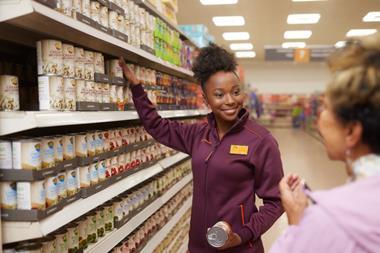
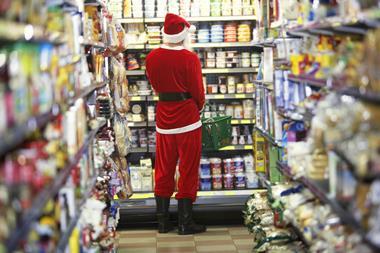
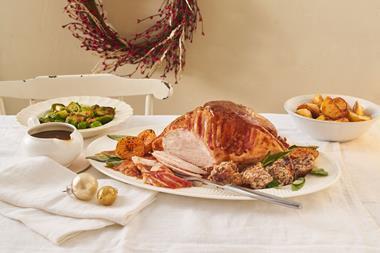
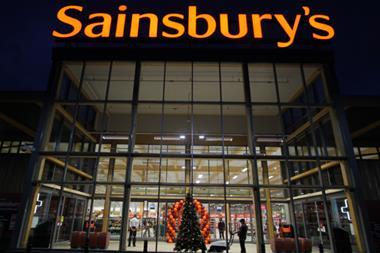
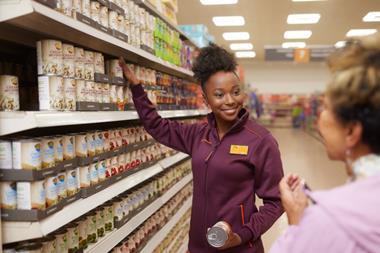






No comments yet